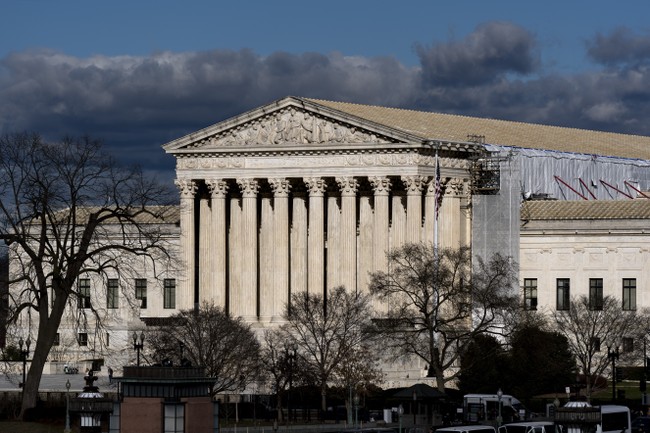
Article III, Section 1, of the United States Constitution, defines the organization of the Judicial Branch as one of the three co-equal branches of government. It states:
The judicial Power of the United States, shall be vested in one supreme Court, and in such inferior Courts as the Congress may from time to time ordain and establish. The Judges, both of the supreme and inferior Courts, shall hold their Offices during good Behaviour, and shall, at stated Times, receive for their Services, a Compensation, which shall not be diminished during their Continuance in Office.
The statement that judges shall “hold their Offices during good Behaviour,” means that judges cannot be removed from office involuntarily except through Congress’s ultimate power of impeachment and conviction. Kamala Harris doesn’t seem to be too familiar with the Constitution, as she is now on record supporting unconstitutional attempts by Congress to impose term limits on the Court.
The Harris-Walz campaign at last posted policy positions on its website Monday, proposing a plan that would possibly result in the forced retirement of Supreme Court Justice Clarence Thomas by next year, along with two more Republican-appointed justices before the next decade.
Released a day before Vice President Kamala Harris heads to the debate stage against former President Donald Trump, the policy outline includes so-called commonsense Supreme Court reforms such as “imposing term limits.” It’s unclear how long Harris believes a justice should remain on the high court before he or she would be automatically forced into retirement, and her campaign dedicated more attention and detail on its website toward attacking Trump for the three justices he nominated during his single term in office.
So, months into the campaign, weeks since Kamala Harris was anointed (not elected, not nominated) as the Democratic candidate, with only weeks left until the election, the Harris/Walz campaign finally releases some policy statements – and one of them is blatantly, stupidly unconstitutional. And it aligns with a bill proposed by Senator Sheldon Whitehouse (D-RI), one of the most wackadoodle nutcases to ever sit in the Senate. Considering that’s a body of people that have included people like Bernie Sanders, the daffy old Bolshevik from Vermont, that’s really saying something.
As pointed out, Congress has no authority to do this under the Constitution.
However, Harris’s campaign has reportedly indicated her position is “aligned” with a more detailed plan to replace at least three Republican-appointed justices by 2029, according to a statement from her ally Sen. Sheldon Whitehouse (D-RI) to the Dispatch last month.
“They have not gone so far as to say, ‘We endorse your bill.’ They have said that your bills are precisely aligned with what we are talking about,” Whitehouse said of his Senate Bill 3096, also known as the Supreme Court Biennial Appointments and Term Limits Act, which would impose 18-year term limits for justices despite sitting lawmakers in Congress facing no such limits.
The legislation calls for presidents to nominate and the Senate to confirm a new justice to the Supreme Court every two years. Only the nine most recently appointed justices would sit for oral arguments, while the remaining justices would effectively maintain a semiretired status and participate in appellate cases as needed, such as in the event of a recusal.
So the Harris campaign is “precisely aligned” with an unhinged bill that won’t pass any constitutional challenge. Par for the course, sadly, for today’s Democratic Party.
See Attached: Left-Wing Vox Ignores Separation of Powers, Suggests Pushing Justices Sotomayor and Kagan to Retire
AOC Makes Mind-Numbing Claim About ‘Constitutional Duty’ of Congress to ‘Rein’ in SCOTUS
There are many reasons the nation – not a democracy, but a constitutional republic – was set up as it is. All of those reasons may be found in the Constitution, with more detailed explanations in documents like the Federalist Papers. I’ve often encouraged people to read the Federalist Papers, explaining that the Constitution is the “what” and the Federalist Papers are the “why.”
Federalist #78 states in part:
The complete independence of the courts of justice is peculiarly essential in a limited Constitution. By a limited Constitution, I understand one which contains certain specified exceptions to the legislative authority; such, for instance, as that it shall pass no bills of attainder, no ex-post-facto laws, and the like. Limitations of this kind can be preserved in practice no other way than through the medium of courts of justice, whose duty it must be to declare all acts contrary to the manifest tenor of the Constitution void. Without this, all the reservations of particular rights or privileges would amount to nothing.
That statement, authored by Alexander Hamilton, explains the importance of an independent judiciary. Such independence requires freedom from restrictions placed on it by a co-equal branch of the government, like Congress or, for that matter, the President. The Judiciary must be independent, as Hamilton stated, to carry out their duty to “declare all acts contrary to the manifest tenor of the Constitution void.”
It’s a shame that a person like Kamala Harris, or Sheldon Whitehouse for that matter, were able to rise to their current positions without learning this.

